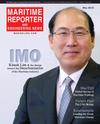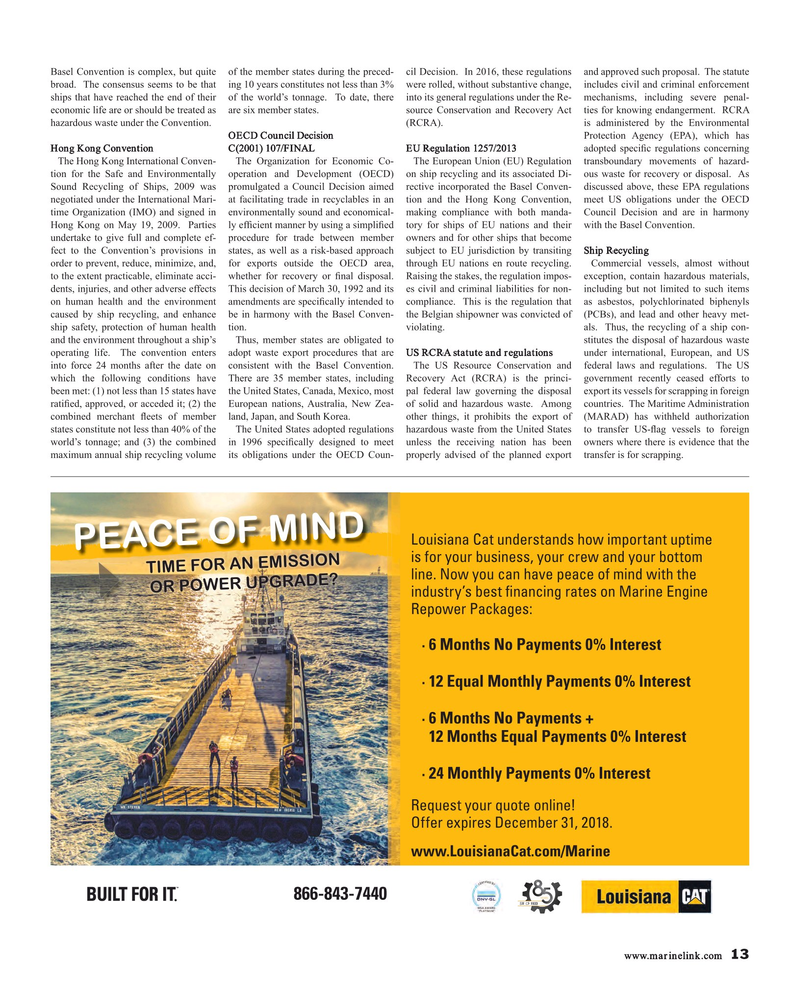
Page 13: of Maritime Reporter Magazine (May 2018)
Marine Propulsion Edition
Read this page in Pdf, Flash or Html5 edition of May 2018 Maritime Reporter Magazine
Basel Convention is complex, but quite of the member states during the preced- cil Decision. In 2016, these regulations and approved such proposal. The statute broad. The consensus seems to be that ing 10 years constitutes not less than 3% were rolled, without substantive change, includes civil and criminal enforcement ships that have reached the end of their of the world’s tonnage. To date, there into its general regulations under the Re- mechanisms, including severe penal- economic life are or should be treated as are six member states. source Conservation and Recovery Act ties for knowing endangerment. RCRA hazardous waste under the Convention. (RCRA). is administered by the Environmental
OECD Council Decision Protection Agency (EPA), which has
Hong Kong Convention C(2001) 107/FINAL EU Regulation 1257/2013 adopted speci? c regulations concerning
The Hong Kong International Conven- The Organization for Economic Co- The European Union (EU) Regulation transboundary movements of hazard- tion for the Safe and Environmentally operation and Development (OECD) on ship recycling and its associated Di- ous waste for recovery or disposal. As
Sound Recycling of Ships, 2009 was promulgated a Council Decision aimed rective incorporated the Basel Conven- discussed above, these EPA regulations negotiated under the International Mari- at facilitating trade in recyclables in an tion and the Hong Kong Convention, meet US obligations under the OECD time Organization (IMO) and signed in environmentally sound and economical- making compliance with both manda- Council Decision and are in harmony
Hong Kong on May 19, 2009. Parties ly ef? cient manner by using a simpli? ed tory for ships of EU nations and their with the Basel Convention.
undertake to give full and complete ef- procedure for trade between member owners and for other ships that become fect to the Convention’s provisions in states, as well as a risk-based approach subject to EU jurisdiction by transiting Ship Recycling order to prevent, reduce, minimize, and, for exports outside the OECD area, through EU nations en route recycling. Commercial vessels, almost without to the extent practicable, eliminate acci- whether for recovery or ? nal disposal. Raising the stakes, the regulation impos- exception, contain hazardous materials, dents, injuries, and other adverse effects This decision of March 30, 1992 and its es civil and criminal liabilities for non- including but not limited to such items on human health and the environment amendments are speci? cally intended to compliance. This is the regulation that as asbestos, polychlorinated biphenyls caused by ship recycling, and enhance be in harmony with the Basel Conven- the Belgian shipowner was convicted of (PCBs), and lead and other heavy met- ship safety, protection of human health tion. violating. als. Thus, the recycling of a ship con- and the environment throughout a ship’s Thus, member states are obligated to stitutes the disposal of hazardous waste operating life. The convention enters adopt waste export procedures that are US RCRA statute and regulations under international, European, and US into force 24 months after the date on consistent with the Basel Convention. The US Resource Conservation and federal laws and regulations. The US which the following conditions have There are 35 member states, including Recovery Act (RCRA) is the princi- government recently ceased efforts to been met: (1) not less than 15 states have the United States, Canada, Mexico, most pal federal law governing the disposal export its vessels for scrapping in foreign rati? ed, approved, or acceded it; (2) the European nations, Australia, New Zea- of solid and hazardous waste. Among countries. The Maritime Administration combined merchant ? eets of member land, Japan, and South Korea. other things, it prohibits the export of (MARAD) has withheld authorization states constitute not less than 40% of the The United States adopted regulations hazardous waste from the United States to transfer US-? ag vessels to foreign world’s tonnage; and (3) the combined in 1996 speci? cally designed to meet unless the receiving nation has been owners where there is evidence that the maximum annual ship recycling volume its obligations under the OECD Coun- properly advised of the planned export transfer is for scrapping.
Louisiana Cat understands how important uptime
PEACE OF MIND is for your business, your crew and your bottom
TIME FOR AN EMISSION line. Now you can have peace of mind with the
OR POWER UPGRADE?
industry’s best fnancing rates on Marine Engine
Repower Packages: · 6 Months No Payments 0% Interest · 12 Equal Monthly Payments 0% Interest · 6 Months No Payments + 12 Months Equal Payments 0% Interest · 24 Monthly Payments 0% Interest
Request your quote online!
Offer expires December 31, 2018. www.LouisianaCat.com/Marine
YEARS 866-843-7440 www.marinelink.com 13
MR #5 (10-17).indd 13 MR #5 (10-17).indd 13 5/3/2018 2:26:19 PM5/3/2018 2:26:19 PM

 12
12

 14
14
